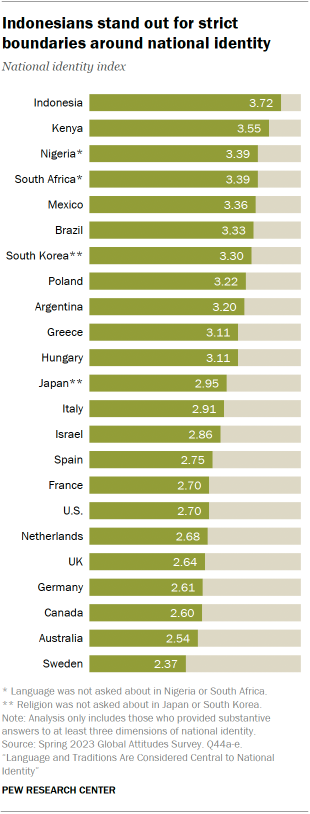We created a scale to examine how the boundaries of national identity are viewed at a country level. The index combines responses for the four dimensions of national identity included in the survey: being born in the country, being able to speak the country’s most common language, sharing the nation’s customs and traditions, and being a member of the country’s main religion.

Each dimension receives a score from 1 (indicating the respondent considers the dimension not at all important) to 4 (indicating the respondent considers it very important). The mean rating for all dimensions is taken for each respondent to create an index ranging from 1 to 4, where a higher score on the scale indicates that more dimensions are considered essential parts of national identity.
Respondents were only asked about a subset of the dimensions in some countries, and the index scores are calculated using only the dimensions that were asked of the respondent. Those in Nigeria and South Africa were not asked about being able to speak the country’s most common language, and those in Japan and South Korea were not asked about being a member of the country’s predominant religion.
Respondents in Nigeria were asked, separately, about the importance of being members of the country’s two primary religions: Islam and Christianity. The index scores were calculated using the religion that received the highest score. For example, if a respondent felt it was somewhat important to be Muslim but not at all important to be Christian to be truly Nigerian, they would be coded as seeing religion as somewhat important for national identity based on their higher score for Islam.
Scores were only calculated for respondents who provided substantive answers to at least three dimensions of national identity. In countries where only three dimensions were measured, respondents who did not provide a response for all were excluded from the index. Our analysis reports the mean score for each country. The overall average for all valid responses is 2.97.
Indonesia has the highest score on the index (3.72) and sees the greatest number of dimensions as important for belonging to the country. Most Indonesians say partaking in the country’s traditions, being able to speak the country’s primary language, having been born in the country and being part of the country’s main religion are at least somewhat important for being a true national. Sweden sits on the other side of the spectrum with the lowest score on the index (2.37). Swedes are the least likely to consider having been born in the country or sharing the country’s main religion as important aspects of their national identity.




